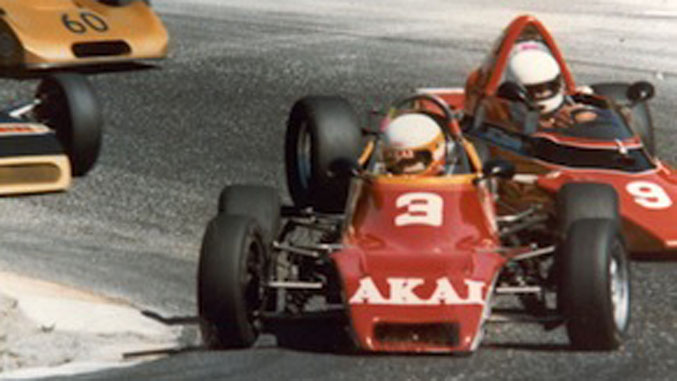Speed Secrets: Managing Your Emotions Behind the Wheel

Recently, a reader emailed me to ask this: "How do I best manage my emotions when racing?" To answer this question – one that I suspect many drivers would like the answer to – I decided to ask a few drivers whom I respect immensely: Johannes van Overbeek, Tom Long, David Murry, and Don Kitch. -Ross
Tom Long:
Managing emotions can be one of the most challenging aspects of motorsports. The mental game is such a critical part for proper focus; it allows peak physical performance to occur in almost any activity.
Take pre-race pressure as an example. Typically, a young driver can be very anxious or nervous, leading to distraction from the real task at hand. Using visualization (or for you Speed Secrets readers, "mental programming") to plan how you'd like the ideal start to unfold, or ideal lap with details such as brake points, car placement, gearing, and so on can help channel that nervous (negative) energy into a productive mindset, preparing you for the race.
Another example, say mid-race, whether you're under yellow waiting for a restart or just can't seem to find your rhythm yet, comes down to focus. Rather than being nervous about that car behind you overtaking on the restart, or worrying that your tires are shot and you need to just limp to finish, think about what you can do to make the most of your strengths. Visualize how you want to set up the restart to get the best jump on the green flag, how you'll set up the pass into T1, or how you might alter your line to optimize what you have left in those tires. Stay positive, and shut out all negative emotions or thoughts from your mind.

In summary, proper focus is the key element to channeling that mental energy into a positive outcome. It's something you continually strive to work on, each event no matter the series, track, or car.
– Tom Long
Web: longroadracing.wordpress.com
Facebook: facebook.com/tom.long
Johannes van Overbeek:
There are between six and eight emotions, depending on who you ask, that every normal human experiences. I’ve listed seven. They generally look like this: anger, disgust, fear, happiness, sadness, surprise and contempt. I’ve felt all of these at some point on track in my career. I’ve also experienced all of these emotions in the span of a lap – Le Mans, on a half-wet track, if you were wondering.
Your emotional response, as I view it from the perspective of racing a car on a track, is one of discipline. Your emotional response to an action on track should be positive and fit in with your objective – winning, finishing, passing the car in front, or not crashing.
For example, somebody is blocking you. The usual response is anger. Now, you have a choice about what to do with that anger. Losing your cool as a result of the anger is exactly what not to do. We’ve all seen this, even in the highest echelons of our sport. Tempers boil, cars get bent, and neither one gets to the end.

Using the blocking example, use anger as a motivator: “I’ll show this person who they’re messing with.” Be patient but unrelenting, unpredictable (this will get them looking in their mirror more than ahead and a mistake is inevitable); outsmart, and outrace the offender.
Control your emotions. Don’t let them control you. It’s easier said than done, but if you can master your emotions, you’ll wield a very powerful tool that you’ll be able to use to get ahead of that jerk in front of you.
– Johannes van Overbeek
Twitter: @JohannesvanOver
David Murry:
Auto racing is a very emotional sport. You have to manage these emotions to be successful (and just to exist without having coronary problems!). I thought about it seriously in 1985 when I got my first big break, driving for Domino's Pizza – a major sponsor. Race day, I had so much pressure on me, I woke up in the hotel that morning and actually threw up. I couldn't believe it affected me that much. Right then, I knew if I wanted to do this for a living, I better figure out how to deal with it.
Emotions affect us before the race weekend, during the race weekend, during the race, and there are even head games drivers and teams play to affect your race.

First, you have to realize that there are no mediocre feelings or emotions in this sport. There are only highs and lows. Winning a race is a super high while finishing poorly or not finishing is an extreme low. You have to prepare yourself for the lows before they happen. For instance, if you win a race and are on a high, you have to realize a low may be coming. But if you just finished poorly or had an accident, you have to know the highs are coming too. It helps to cope with those emotional lows.
For all those head games other drivers and teams are using, you have to remember it's all talk. All that matters are facts and talk can't change physics. Ignore the talk that is not productive.When you are driving, you can't let emotions affect your performance. In 1983 (yes, I am old), I was leading a Formula Ford race at Sebring with the likes of Michael Andretti and others behind, and on the last lap, a car pulled out of the pits in front of me and my lead was cut to five seconds. When I was only 50 yards from the finish, I panicked, thinking the cars behind me were going to pass me, and I spun, causing me to finish 3rd instead of winning. I was so mad, I hit the steering wheel so hard it bent. I learned from that, and my new thinking was to pay off for 35 years. It's one thing to catch a car, but another to pass them. Those drivers didn't beat me, I beat myself. If a car is catching you, don't beat yourself – make them work to pass you.
Drive by physics, not emotion. Nobody can defy the laws of physics and go faster than they will allow. Don't think: "How fast can I drive?" Think: "How perfect can I drive these corners?"
– David Murry, David Murry Performance & Track Days
Web: davidmurry.com
Facebook: facebook.com/david.murry.71
Twitter: @davidmurry
Don Kitch:
- Stress
- Anxiety
- Frustration
- Fear
- Anger
- Impatience
When I was a bit more active as a race car driver, these are just a few of the emotions I felt and managed while in the car. Presently, as a race driver coach and consultant to law enforcement, these are emotions I see, feel, and hear from race drivers and enforcement officers as they meet the challenge of competition and precision driving.

In my experience, if you are not feeling and experiencing these emotions, you are either not performing to your highest level, not totally committed to your craft, or you are not being honest with yourself. They are present, or should be. The question is – what do we do with them? How do we manage them?
I do know trying to eliminate them completely is a mistake and a missed opportunity. Properly balanced and controlled, these emotions can be very effective tools in gaining the result a driver is seeking. In other words, productive instead of destructive.
Let's explore the emotion of "fear," as an example. When we ask ourselves why a race car driver or an enforcement officer in a pursuit situation would exhibit fear, the logical answer would be concern for injury. Not so. While situational awareness does broadcast some concern for potential injury, that concern is not the primary source of the fear emotion. Concern for failure is what is scaring our driver. The ego-driven "A" type personality cannot tolerate failure. No driver wants to let the team down, be the one that just walks back with nothing but the steering wheel, or lets the bad guy evade capture.
So, now that we have identified the true source of the emotion and can redefine it; from here we take our driver back to visit his/her inner belief system. Built strong enough, with confidence in developed skills, this belief system should redirect the strength of the fear emotion taking our driver away from the "dark side" of concern for failure. Once in place, this program can have a trigger word or act attached to it that the driver can use to activate the program in the car or prior to driving when he/she feels the emotion presenting.
Frustration, anger, and impatience are three very common in-car emotions. These three are very powerful and can be very destructive to a driver's performance level. The source of these three emotions is typically something that is not within our driver's control. Once we help our driver understand that "there is nothing you can do about that," we then direct all that emotional energy toward a complete focus on "what you can control."
This path can be taken to manage any of our emotions in the car or prior to driving. Identify the true source of the emotion, program an escape, and then attach a trigger to activate the program, converting the emotion from destructive to productive.
– Don Kitch, Jr.
Web: ProFormanceRacingSchool.com
Facebook: facebook.com/ProFormanceRacingSchool
Exerpted from Ross Bentley’s Speed Secrets Weekly. For more tips and additional articles on the art and science of racing, click here to subscribe.
Also be sure to check out Ross Bentley's book, Ultimate Speed Secrets: The Complete Guide to High-Performance and Race Driving.
+ Speed Secrets: The Virtues of Time Attack Events


















